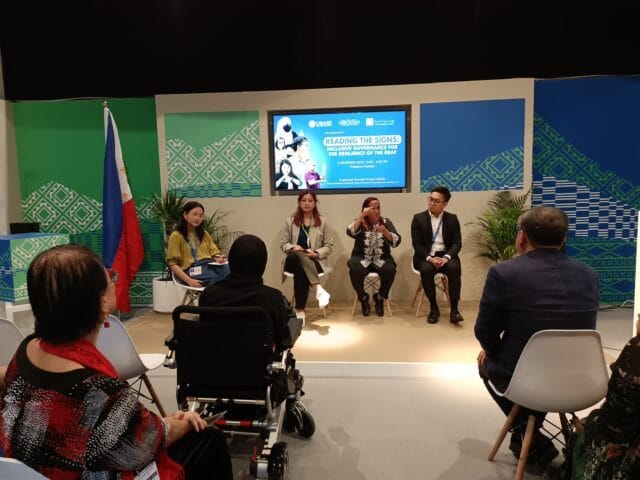Deaf community builds sign language corpus for climate change vocabulary

Source: Rappler
Author: Iya Gozum
MANILA, Philippines - For Carolyn Dagani, a member of the deaf community, she first started to understand climate change through disasters. The climate crisis is first a lived experience. Now they are trying to assimilate that experience into sign language.
"Many deaf people know about disasters," Dagani told Rappler through her interpreter. "But when it comes to climate change, we only have little knowledge about that."
Dagani, 53, served as president of the Philippine Federation of the Deaf (PFD) from 2015 to 2023. Her leadership saw the passage of Republic Act No. 11106 or the Filipino Sign Language (FSL) Act, making FSL the official language in all transactions relating to the deaf.
Dagani is now part of the the initiative Project SIGND (Climate Resilience of the Deaf: Signs for Inclusive Governance and Development), led by science foundation Oscar M. Lopez Center, making a corpus of sign languages for climate change vocabulary.
Merriam-Webster defines corpus as "a collection of recorded utterances used as a basis for the descriptive analysis of a language."
Dagani's Project SIGND in collaboration with OMLC is building a collection of recorded videos of members of the deaf community making the signs for climate change terms. It would keep record how the deaf perceive and communicate the crisis.
Their initiative took them across the country, interviewing the deaf, recording and then later analyzing videos. The breadth of human experience on climate change impacts reflect on the many variations of sign language for a single word.
For example, across 17 provinces and various interviews, they found 96 sign language variations for the word 'rain.'
Corpus building started in 2022. What is rain? What is heat? These are basic questions that come with several answers from the deaf community. OMLC's work is to collect these signs. They expect to release their work early next year.
"You cannot communicate climate change without knowing the words for it," said Therese Guiao in a forum on Monday, April 22. Guiao is the operations director of environmental consultancy firm Parabukas.
Guiao said this is the first initiative of its kind in the Philippines, a huge project they hope would produce climate change champions from the deaf community.
During an interview with reporters, Dagani quoted a favorite saying. "The hearing should work with the deaf, not for the deaf."
Forming a corpus of climate change could help them participate in summits, conferences, where climate policies for the vulnerable and people with disabilities are being discussed.
Dagani shared her experience when she attended the 28th United Nations Climate Change conference in Dubai, United Arab Emirates. She said she had the chance to present Project SIGND in the Philippine pavilion.
The experience in Dubai "developed a deeper desire" inside her to raise climate change awareness in the Philippines. But she cannot help but notice that, in a summit where climate issues are supposed to be at the frontlines, it lacked interpreters for deaf people like her.
In an arena like COP28, where hearing people understand each other through climate-speak or jargon, the space for deaf community could shrink.
"The whole project [means] leaving no one behind," Rodel Lasco, executive director of the OMLC, told reporters on Monday. "Part of inclusivity is to make sure the most vulnerable of our people is capacitated and really ready for global warming."
Dagani said she is hopeful that Project SIGND continues, especially now that the Komisyon sa Wikang Filipino (KWF) committed to the project.
"Without this we will not be able to learn. And deaf people are being set aside and we lag behind in information," said Dagani.
